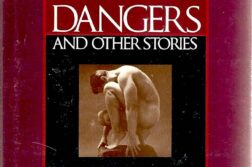A CHEAPLY MADE black-and-white film, The Beatniks (1960) was voice actor Paul Frees’ only directing venture. It succeeded with neither critics nor the public, and it boasts a pitiful 2.1 rating on IMDB. However, I would contend that this B-minus movie is significant for its homosexual subtext.
The Beatniks was badly mistitled. Beatnik culture—bongos, berets, goatees, marijuana, poetry in coffee shops—is nowhere to be seen. The movie may have been given the misleading moniker to cash in on contemporary interest in “youth rebellion.” Another possibility is that the filmmakers believed—or thought the public believed—that “beatnik” was a synonym for “hoodlum.” In fact, the film is about a robbery gang made up of leader Eddy Crane, members Bob Mooney, Chuck, Red, and Eddy’s girlfriend Iris.
The movie begins with a car stopping in a small store’s parking lot. Eddy orders, “Put your masks on.” Inside the store, an elderly man and woman hold their arms up. Mooney acrobatically whirls around as he robs the cash register. Mooney makes a show of taking a liquor bottle, asking, “How much is that?” The male victim replies, “Be my guest.”







